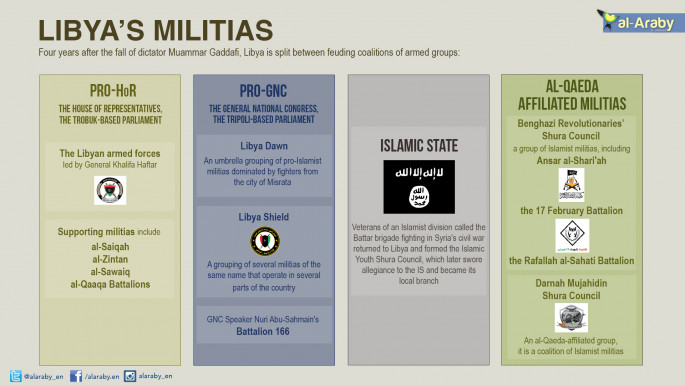UN will continue with efforts to clinch Libya deal
UN will continue with its attempts to broker a national unity government with Libya's warring factions after the elected parliament rejected a proposed agreement to end the crisis.
3 min read
Libya's two rival governments have not endorsed a UN-proposed power-sharing agreement [AFP/Getty]
UN envoy Bernardino Leon insisted Wednesday that efforts to clinch a political deal to end the turmoil in Libya will carry on although several parties have rejected his proposals.
Leon's remarks come a day after Western and Arab states issued a joint declaration urging rival sides to accept a UN plan for a power-sharing government "immediately".
"The process goes on. There is no chance for small groups or personalities to hijack this process," Leon told a news conference in Tunis.
"The political solution is the only real alternative," he said, adding that further meetings would be held in the coming days.
Leon's remarks come a day after Western and Arab states issued a joint declaration urging rival sides to accept a UN plan for a power-sharing government "immediately".
"The process goes on. There is no chance for small groups or personalities to hijack this process," Leon told a news conference in Tunis.
"The political solution is the only real alternative," he said, adding that further meetings would be held in the coming days.
Libya's government in Tobruk on Monday night rejected a UN proposal for a power-sharing arrangement with rival Islamist-led authorities that was intended to bring peace to the north African nation, leaving Libya without an internationally recognised government.
The government in Tobruk will not sign the agreement to form a unity government because the UN refused to exclude amendments added by the Islamist authorities without its consent, government spokesman Farraj Abu Hashem said.
Libya slid into chaos after the 2011 toppling and killing of long-time dictator Moammar Gaddafi. One government is based in the far eastern town of Tobruk, while a rival Islamist-led government is based in the capital, Tripoli.
The Tobruk government was internationally recognised - particularly by Western powers - but as of Tuesday, the government's mandate lapsed before the two governments could endorse a unity government that was proposed by the UN.
 |
|
"The majority of Libyans want a political solution," he added.
The new UN-backed government was to have been headed by Fayez el-Sarraj, a member of the Tripoli parliament, and include three deputy prime ministers - from the west, east and south of the country.
UN deputy spokesman Farhan Haq said Leon has made clear "that this is the final text".
"We are not reopening the text and our hope remains that all sides will agree to the text for the good of the people of Libya," Haq said.
The amendments that angered the Tobruk lawmakers would have given the unity government the power to fire all senior Libyan officials not unanimously approved by its members. The Tobruk government saw this as an attempt to remove their fiercely anti-Islamist army chief, Gen. Khalifa Haftar, whose forces have been battling Islamist militias nationwide for over a year, government spokesman Ali Tekbali said.
The Islamist-led government did not officially reject the deal, but said "signing it would lead to further complications" in a statement issued on Monday.
The Tripoli government objects to the deal because it does not provide sufficient guarantees that Islamic law will be implemented, members of the Islamist parliament said.
Both governments have slammed Leon for announcing candidates for the unity government when they had not agreed on forming one yet.





 Follow the Middle East's top stories in English at The New Arab on Google News
Follow the Middle East's top stories in English at The New Arab on Google News
![Israeli forces ordered bombed Gaza's Jabalia, ordering residents to leave [Getty]](/sites/default/files/styles/image_330x185/public/2176418030.jpeg?h=a5f2f23a&itok=_YGZaP1z)

